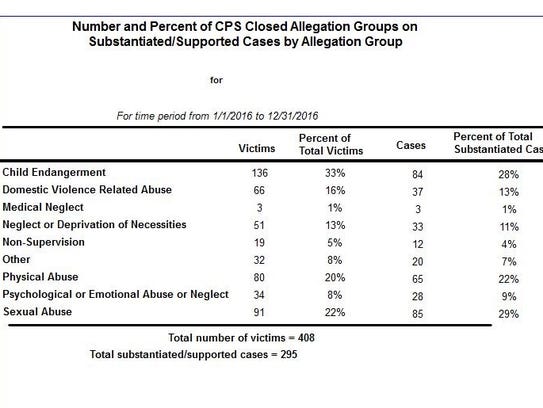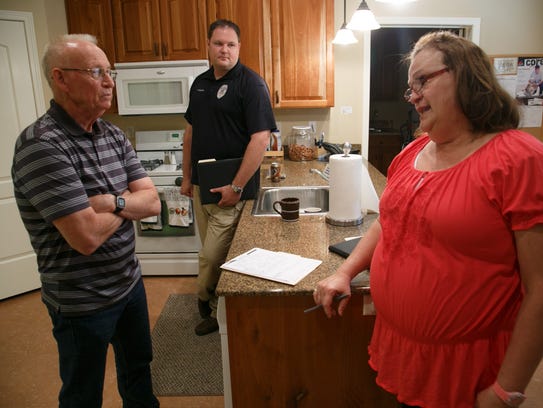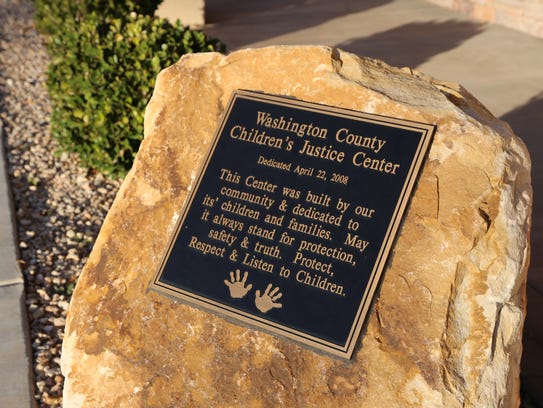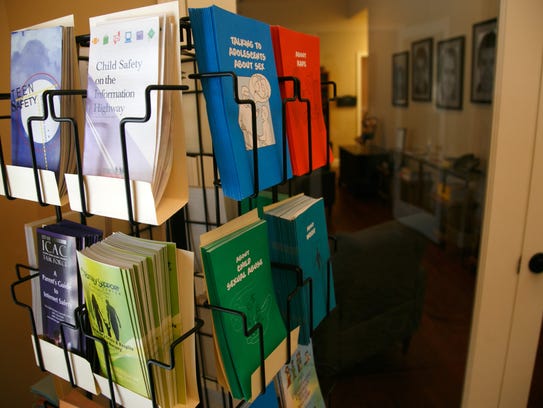Plenty of people have been in a situation where they've witnessed or suspected a child is being abused. Sometimes it's easily identifiable. Other times it's not.
Is what I just saw actually child abuse? What if I'm wrong and I report something false? How do I know for sure? What if this child is acting strangely for another reason?
The Washington County Children's Justice Center opened 249 investigations of child abuse in 2016 alone. That means 249 children were interviewed by a forensic interview specialist based on suspected or disclosed abuse they had experienced. At least 249 families — most likely more, since WCCJC Director Shelly Teeples says child abuse is grossly under-reported — had their family dynamics challenged by neglect, child sex abuse, child physical abuse or a combination of any child abuse in 2016.
In fact, the Division of Child and Family Services reported 408 total victims of child abuse in Washington County for 2016.
"I have seen cases of horrific child sex abuse and physical abuse come out of homes of highly-esteemed people in the community," Teeples said. "You can't sensationalize child abuse. It happens everywhere, across every socioeconomic background. It has no boundaries."
What are the most common child abuse cases in Washington County?
Deputy County Attorney Ryan Shaum said in the more than 20 years he's been a prosecutor, he's learned to never say never.
"Many years ago, I said, 'I've probably seen everything.' But I found out there’s always something you’re not expecting to see," Shaum said. "Sometimes you just never know what evil capacity there is in humankind."
There are several types of child abuse, including physical, emotional, neglect, sexual touching and sexual non-touching. Ashley Sumner, a public information officer with the DCFS, said one of the most common misconceptions is in order for officials to investigate child abuse, there has to be a mark.
"That's definitely not true," she said. "There are many things that can be damaging to kids that don't leave a mark."
According to Sumner, 295 of the 408 total child abuse victims in Washington County had substantiated or supported cases. There are 121 Washington County children who are currently in foster care who were placed due to concerns of abuse, neglect, or dependency, which means they most likely were victims of abuse, but they don't necessarily have to have a substantiated CPS investigation to be in foster care, Sumner said.

According to DCFS, Washington County reported 408 total child abuse victims in 2016. The Washington County Children's Justice Center assisted in a bit more than half of those investigations. (Photo: Division of Child and Family Services)
The majority of cases that the WCCJC sees are sexual abuse cases, but Teeples said the center has seen an increase in Washington County children falling victim to human trafficking. Human trafficking can take form as a child running away from home and being "pimped out" on the streets, a child being used to produce pornography, or child labor.
"It's a crisis state-wide," Teeples said. "Everyone is seeing more cases of human trafficking."
Teeples added she can't say for sure if the increase of cases means that it's on the rise in Utah or that people are simply more educated and are more frequently calling it what it is.
Among the child sex abuse allegations that advance to charges being filed against an alleged suspect, Shaum said the most common cases involve allegations of sexual touching. Sodomy or rape of a child are a bit less common, Shaum said, but they certainly aren't non-existent in Southern Utah.
However, several, perhaps more severe and high-profile cases have come out of Washington County in recent years. One case involves a 12-year-old boy from Toquerville who was located in the bathroom of his home for at least one year, weighing just over 30 pounds, police reported.
The boy's mother and father, Brandy and Russel Jaynes, have both been charged with aggravated, intentional child abuse for allegedly malnourishing him while he was kept locked in the room that police said was covered in feces. While technically at different stages in the process, neither co-defendants have entered a plea, so whether or not the cases will be resolved before prior to trial is currently unknown.
"We don't see a lot of severe neglect cases like in the Jaynes case," Shaum said. "That's very unusual for us here, and it certainly happens, but you just never know."
Additionally, Shaum said cases involving physical abuse in Washington County typically aren't what they would call "severe."
"We don't get a lot of cases involving broken bones, brain issues with swelling or those sort of things," he said. "Those do not come through our office very often. That doesn't mean there aren't a lot of physical abuse cases, but when we talk about serious physical abuse in the felony range, there are many more sexual abuse cases."
Earlier this month, a Hurricane man was sentenced to up to 16 years in the Utah State Prison for kicking and chocking his girlfriend's 9-month-old baby. The baby did, in fact, suffer fractured ribs, a fractured tibia, and a fractured fibia in addition to contusion marks all over his body, blood spots in his eyes, and bruising on his forehead and jaw.
Another notable case involving child abuse in St. George was that of Gregory Todd Fullerton, who's case had been the oldest active prosecution in Washington County until December. He was found guilty of a homicide involving child abuse after he caused fatal injuries to a 4-month-old he was tending, including brain swelling.
While Teeples acknowledged the community's response of love and support to the victims in some of the county's higher-profile cases, she said the dark side is always lingering.
"It's bittersweet for (WCCJC staff,)" she said. "It's touching to see the outreach of love, but we know that it happens all the time."
The good news? A "great majority" of child abuse cases filed by the county attorney's office that have gone through the WCCJC end in convictions, Shaum said.
"Very rarely does serious sexual or physical assault on a child get resolved at the misdemeanor level," Shaum said. "Most will resolve in a conviction of a felony."
How do perpetrators get caught and prosecuted?
The WCCJC doesn't get involved in every single child abuse case, but it does intervene when child abuse is suspected or disclosed. Typically, child abuse is disclosed to law enforcement through Child Protective Services, and at that point, the WCCJC will schedule an appointment for an interview, in which Teeples said the whole team gets involved.
Rather than having a child interview with several officials more than once about a specific incident, justice centers are designed to house the forensic interview in a welcoming atmosphere with professionally-trained staff. Teeples said this process leads to higher disclosure rates and better outcomes overall, including more articulate interviews for prosecutors to use in court.

Washington County Sheriff's Dept Detective Richard Triplett, left, and St. George Police Department detective Adam Olmstead discuss their cases with Utah Division of Child and Family Services investigator Christie Howes, right, as they stand in the kitchen of the Children's Justice Center in St. George Friday, April 11, 2014. (Photo: Jud Burkett / For The Spectrum & Daily News)
Forensic interview specialists are in charge of interviewing the children in rooms that Teeples said gives a feeling of home. The interviews are recorded and also scripted, as to not ask any "leading" questions. The forensic interview specialists build rapport with the child, establish ground rules, and then move into a form of questioning that allows the child to open up and tell his or her story.
"The forensic interview specialist is always referring back to what the child said, so there's no leading questions," Teeples said. "It makes our cases more solid. We get more and better disclosures than we've ever had with the forensic interview specialists."
Teeples said the interview specialist reports a high disclosure rate among children, but the cases can oftentimes be subjective. Because of this, not every case leads to charges or is considered actual abuse. However, each allegation is investigated thoroughly as though it is abuse, Teeples said.
Officials don't always need a confession to charge an alleged perpetrator, either.
"Sometimes that child’s interview is so compelling that physical evidence or a confession isn't needed," Teeples said. "The child has to disclose it without being led to say it."
For children who aren't interviewed at a justice center, Sumner said DCFS will conduct an interview at a school or in the home, depending on the severity of the allegations.
Sumner said social workers or law enforcement are typically the individuals who decide whether or not a disclosure is child abuse.
"We want people to understand that when they call, we're not going to go out and take these kids away," she said. "You'll talk to a social worker who can talk you through what you're seeing and maybe help you determine if abuse is going on or not."
 Buy Photo
Buy Photo
The Washington County Children's Justice Center has been fielding incoming phone calls from across the globe from people asking how they can help in a case of an extremely malnutritioned 12-year-old. (Photo: Emily Havens / The Spectrum & Daily News)
Once an investigation is opened, Shaum said a law enforcement official will often arrest an alleged suspect based on what they believe is probable cause.
"There are many cases, however, that come over for us to review to determine whether or not charges will be filed. There's a significant number of those," Shaum said.
There are a number of reasons why child abuse cases are difficult to prove, Shaum said, but they review all evidence presented and make sure they're "doing what's right in the interest of justice" as well as supporting a child who's been abused in any way.
Shaum acknowledged that since child abuse cases sometimes take years to get resolved, the actual act of prosecuting this type of offense can take an emotional toll on a child, adding that there are a lot of factors that go into determining what the best course of action is.
"A year is an eternity to a little kid," Shaum said. "You take that into consideration and decide whether or not this child is going to be OK in the long haul and what impact, or what sort of potential difficulties, they've had on the child if they go through with this."
In the works for the WCCJC is a medical exam room, which Teeples said is another big step in the right direction toward giving families the advocacy and resources they need. The nursing staff will be able to perform acute exams on children who have been physically or sexually abused within hours or days and well-child visits. Additionally, the center will soon be able to test and treat sexually transmitted diseases.
"We are lucky," Teeples said. "The children of Washington County are lucky."
How can I educate my child in order to help prevent abuse?
So what's something highly unlikely for a social worker, law enforcement officer, or CPS worker to allow their children to do? Have sleepovers.
"So many interviews start out with, 'Well, I was at a sleepover at my friend's house, or at a sleepover at my cousin's house,'" Teeples said. "Ask any detective, any CPS worker, or any social worker what we do with our kids, and we all seem very paranoid. We see how much of it really goes on."

Literature on a variety of topics relating to children and abuse stands on a display just inside the front door of the Children's Justice Center in St. George Friday, April 11, 2014. (Photo: Jud Burkett / For The Spectrum & Daily News)
Explain to your child where touching is OK and where it's not OK, Teeples said, and draw very clear lines that help your child understand appropriate and not appropriate play. Parents should build relationships with their children in order to create a culture in the home that will encourage children to disclose to their parents if something has happened to them, she said.
The national child abuse reporting rate is low, Teeples said, and the Utah Coalition Against Sexual Assault reports only 21 percent of Utahns report their rape.
"But we're seeing more kids step forward because it's talked about now, so I hope it gets much better," Teeples said.
What should I do if I suspect someone is abusing my child or a child I know?
All adults are required to report when a child has disclosed or when they suspect child abuse. When this happens, individuals should call CPS, DCFS or local law enforcement.
According to Prevent Child Abuse Utah, some long-term effects of child abuse can include alcoholism, poor quality of life, depression, drug use, suicide or suicide attempts, liver disease, increased risk of partner violence, and increased risk of sexually transmitted diseases.
Thus, it's the entire community's responsibility to ensure children are nurtured, happy and healthy.
"Just like everyone pays taxes, we want to invest in our children who are going to be raising the next generation," Sumner said. "We want them to have stable, nurturing relationships and are able to live in our communities and be productive members of society."
Teeples said adults need to be aware of how they react to a child who has disclosed abuse. Overreacting to their abuse can be damaging.
"You don't know what that child has been told," Teeples said. "You don't want to make them feel bad or shut them down right out of the shoot because you had this overreaction."
The best things to say to a child who's alleging abuse is it's good they told someone, it's not their fault, they're going to find help, and it's important to tell others.
Additionally, of the utmost importance is to believe the child.
"I've talked to victims who have said their abuse was terrible, but far worse was when they said a parent didn't believe them," Teeples said.
This article originally appeared on thespectrum.com. Click here to read the original article.
